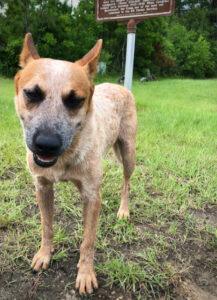
Layla, who helps sell Sugartown watermelons at a roadside stand and is a very good girl. Photo by John Griswold.
First, you best get on it, if you hope to drive that road. A lot of the beauty, charm, and squalor remains, but it has changed in the nine years I have been driving it. The changes to date have been mere tinkering in comparison to what is coming. Until recently, it was easy to see fields that looked as if they might still be plowed with a team, to cross the old bridges, to visit the weird little museums and roadside stands, to see the downtowns, even if they are often shells of their former selves.
The new changes are not small, will not leave the old places and ways intact. The road itself is being enlarged and renumbered in order to be an extension of one of the major highways running north-south in the heartland. Even this was interesting, to see what got demolished or cut down, trip after trip, and how the pilot cars led traffic, one direction at a time, through miles of construction, ending with a flag person with a walkie-talkie.
Is this how it is done everywhere? your son asked then, but now the pilot cars are gone. The temporary painted lines and lack of guardrails and signs still offer a sense of being unfinished, a little unsafe, which can be nice and is, truth be told, one of the main reasons for driving that road.
Second, be prepared to do without. Long stretches of road are gasoline- and food-deserts. That means no bathrooms, either, unless you pull off on a forest service road or a hunter track and take your chances in the pines. Maybe you like to start at dawn, so coffee is necessary, but after you go through your travel mug from home there is nothing but gas station coffee, coffee like ashes, scalding coffee, with strange artificial cream and tragic accidents of too much sugar. If you did not have gastric reflux before, you have it now, by reading the last sentence.
Third, remember that you wanted to see it because it is different, and in a corporatized world, different is good. What this really means is that you are different, not just a traveler, but a stranger, an interloper, a potential carpetbagger, and you will be treated as such by those who actually live there. It is The Land of the Staring People. You can try to fit in—take off your glasses and leave them in the car; wear military-themed t-shirts; use your aches from 12 hours of straight driving to hobble in to the mini-mart as if you ache from a day down at the lumber mill—but it will in fact will make things worse. The customer in front of you will get their, Hi, honey! and a long chat at the register, even as you stand awkwardly hoping to pay for fudge-brownie M&Ms and sackcloth-filtered coffee. When it is your turn you will get tightened lips and silence.
There is a solution. Turn off your post-post-irony, questioning, judgmental soul. Do not have a thought in your head as you stare into the deli case at the array of fried foods under brilliant warming lights, and allow yourself to feel more than think: That’s gonna taste good. Slowly consider the cornmeal-fried catfish fillets, the batter-fried Cajun chicken tenders, the fried-flour-tortilla cheesyito rollups. If you do it right, time will stand still, which will mean you are no longer a person in transit. Perhaps a thousand years will pass. Kenny Chesney will sing about livin’ life with no sense of time, the 50-yard line, some raspberry wine. Others will be standing in the gum aisle, in no hurry either, perhaps not even in line, and no one will mind if you have lost your mind or sense of time.
Suddenly you will realize that the disembodied voice of a woman, coming from behind the counter, the napkin dispensers, the signs saying things about hunting and fishing keeping kids off drugs, is directed at you. She will be asking kindly if you are interested in getting something and calling you honey and sir.
